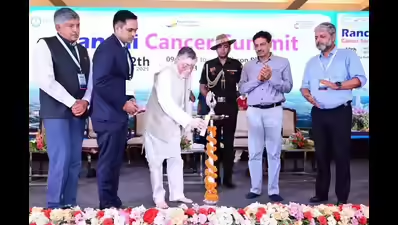
Ranchi Sadar Hospital to Be Developed into One of India’s Largest Government-Run Cancer Centres
Ranchi – In a major move to strengthen cancer care infrastructure, the Jharkhand Department of Health, Medical Education, and Family Welfare has announced the establishment of dedicated oncology departments in five government medical colleges. The announcement was made by Health Secretary Ajoy Kumar Singh during a state-level cancer summit held in Ranchi.
The new departments will come up in Dhanbad, Jamshedpur, Hazaribag, Palamu, and Dumka, while Ranchi Sadar Hospital is set to be developed into one of the largest public-sector cancer treatment centres in India.
Comprehensive Screening, Full Insurance Coverage to Be Rolled Out
Singh stated that under schemes such as Ayushman Bharat, Mukhyamantri Gambhir Bimari Yojana, and others, cancer treatment will be fully covered, significantly reducing out-of-pocket expenses for patients.
He also announced the launch of a statewide screening program for oral, cervical, and breast cancers at Primary Health Centres (PHCs), Community Health Centres (CHCs), and Ayushman Arogya Mandirs. Diagnosed cases will be recorded on a centralized digital portal and referred for higher-level care to ensure timely intervention.
Private Sector Collaboration to Bridge Specialist Shortage
To address the gap in specialist care, the state will engage private doctors in public health delivery, offering honorariums of ₹600–₹800 per OPD consultation and 13%–35% of surgical procedure charges.
“If private doctors offer even one day a week in government hospitals, they will be acknowledged and compensated fairly,” Singh noted.
This public-private partnership aims to enhance both accessibility and affordability, especially in rural regions.
Early Diagnosis Crucial: Majority of Cancer Cases Detected Late
Jharkhand sees between 14,000 to 16,000 new cancer cases annually, with nearly 60% detected at advanced stages, significantly reducing treatment success rates and increasing costs.
Oral cancer accounts for 38% of all cases in the state, while cervical and breast cancers together comprise 16%, highlighting the urgent need for mass awareness and early screening.
Experts Call for Equitable Access and Better Diagnostics
Dr. Satish Sharma, senior oncologist and summit coordinator, stressed the need for balanced efforts in awareness, clinical research, and equitable care across rural and urban populations.
“We must ensure rural patients receive the same level of care as urban patients,” he said.
Dr. Sanjeev Sharma, Director of Lung Connect India Foundation, shared concerning findings from a recent patient survey:
- Over 80% of patients faced delayed diagnoses
- Many were misdiagnosed with TB
- Half of them experienced financial hardship due to medications not covered under insurance